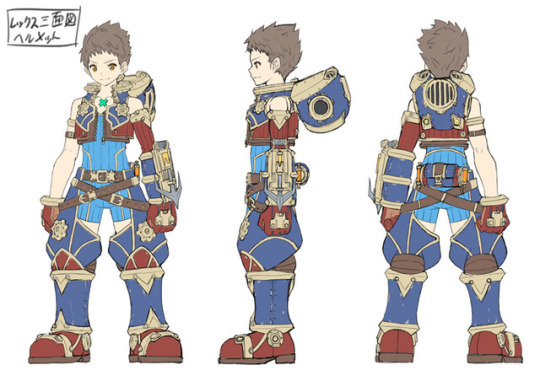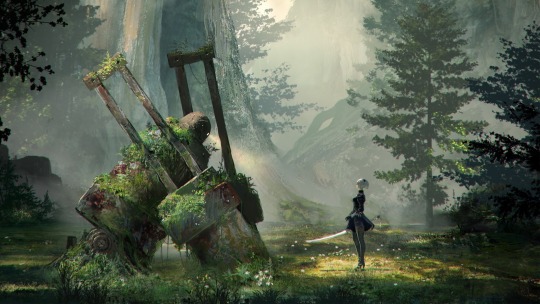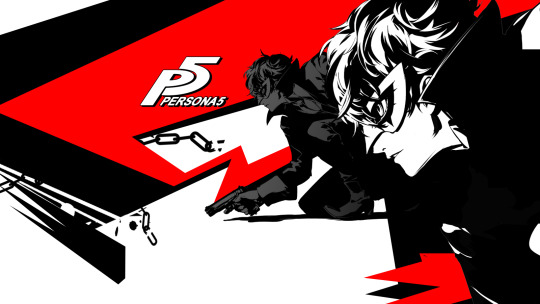#but this gen 2 is so fresh in terms of gameplay? for me i mean
Explore tagged Tumblr posts
Text








it was love day
#simblr#ts4#ts4 gameplay#nightmare legacy challenge#f: baudelaire#baudelaire: 2#s: thomasin#s: miguel#i feel like it's very them to get spontaneously engaged in their underwear#i think they will hold a small celebration for their wedding though and invite their family over#ngl i'm having way more fun in this gen than the first lol#i mean gen 1 was alright because i really love rust#but this gen 2 is so fresh in terms of gameplay? for me i mean
60 notes
·
View notes
Photo

State of the Art: JRPG Spotlight-
Issue #1- 2017 at a Glance- A quarterly or bi-annual journal on the JRPG at large, focusing on recent releases, trends, quarterly reviews/analyses and upcoming release hype.
The other night I was getting yet even deeper still into the freshly minted minor-masterpiece that is Xenoblade Chronicles 2 when it dawned on me just how good 2017 was to the quaint little genre known as the JRPG. I knew all year while it was happening that some special games were getting released with a certain regularity, but now that the dust has fully settled, we can look back and be conclusively impressed by such a stellar stretch.
3 or 4 years ago I think people were getting ready to pen their moratoriums on why big developers and JRPGs should soon plan on never intersecting again save for small-scale handheld releases, and now here we are and Japan is seemingly back on top as far as role-playing goes. That return-to-form didn't always seem so inevitable as it is now that it's fully underway, especially after a somewhat shaky stretch for the genre during the 7th generation. Indeed, high-definition graphics and devs who catered to Gatorade-guzzling gamer bros seemed to not be the boon to the genre that old-school role-players really needed, and even the first couple of years of the 8th generation saw the genre to still be on slightly shaky ground, without a ton of great titles to point to from those initial years.
But then throughout the 7th gen a little franchise called Dark Souls (a JRPG in spirit, though not quite in practice, in many ways) started to build a little following, generating new interest in things like difficulty, customization, and innovative diagetic story-telling. As of the middle of this decade though, the genre still doesn��t have all that much of a presence compared to the late 90s heyday of JRPGs. Cut to 2016 though and Square drops FFXV which is a solid, if not-perfect realization of the 30-year-old standard-bearer of the genre, (a herald of sorts, if you will) and BAM. 2017 begins and in quick succession Nier Automata, Persona 5 and Breath of the Wild drop, all to stunningly positive reception. Now BotW, like Dark Souls, is not as much of a JRPG as the other 3 releases I hope to focus on, but Zelda has always had it's toe in the same waters as Final Fantasy and Dragon Quest, borrowing and simplifying elements of role-playing games from an action-adventure perspective, and in turn, also influencing those very JRPG franchises it seemed to pay homage to.
This wasn't just a coincidental blip of releases though, proved largely by the fact that all the way at the end of the year, Xenoblade 2 would also drop, and show yet again how the JRPG can be fresh and vital, and can be a Nintendo-exclusive at that. Indeed, I hope to demonstrate my thesis that it was a particularly strong year by triangulating my discussion around Nier A, Persona 5 and Xenoblade 2. Not only are these three very strong titles, they are also all pretty vastly different styles of JRPGs, which I think displays the health and potential of the genre even better than the fact that they are so individually good. First of all we have an industry veteran and mad-hatter in Yoko Taro finally coalescing a fully-realized vision of action-JRPG greatness by collaborating with Platinum games to make something as heady, and intellectual as it is well-designed and fun to play. That game is something like a Hegelian Philosophy PhD driving a Lamborghini in terms of the amount of stuff going on with the writing and character development, all while sporting a super classy luxury sports-car, six-cylinder engine. For long-time fans of Taro, I don't think this direction could have ever been predicted, though they may have secretly dreamed of such a fusion of form and function.

The best thing about how simultaneously weird and playable Nier A is for me is the way it hearkens back to the golden age of PS2 JRPGs for me personally. Without pinning it to a single PS2-era title, it gives me the same feeling that games during that console could consistently deliver on: a fully realized fantasy/sci fi world, a deep-yet-approachable combat system, a weird and very-Japanese, but also deep-as-hell plot, and a certain functionality that games like Kingdom Hearts 2, Rogue Galaxy and Final Fantasy XII delivered on back then. I don't mean to say it's derivative or stuck in the past, it's just that, the highlights of the PS2 days are my go-to precedent for what a good modern, post-16-bit JRPG is, since that equally sweet ps1 era can only be reasonably emulated on smaller and/or handheld retro-style releases. And while the story’s depth and esoteric nature recall the plot’s and worlds of PS1 and 2 greats like FFX, Xenosaga or Vagrant Story, the combat itself feels as fast-and-furious as hack-n-slash classics from then like Devil May Cry.
So while Nier had action-(j)RPG style gameplay covered, Persona 5 was there for all the turn-based devotees, and oh boy were we there for it also. That game was a huge victory lap for Atlus, who has built up a deep fanbase over the past decade, largely because of youtubers (at least in the west we can thank the cult-y presence of its fans online for the slow-burn development of an army of Atlus acolytes, whereas P3 and 4 were only barely noticed in the States back when they actually first came out.) And they finally capitalized on that hard-earned interest by finally following up P4 after nearly a decade, and while they were at it, they also showed everyone that fully turn-based (not even slightly active-time) systems can still melt faces, please crowds and feel fresh, which is no mean feat at all in a world where some question if turn-based is officially dead save for retro-homages.
And while Nier captures a kind of ethereal PS2-esque quality, Persona very literally pulls some of the PS2-era goodness into the future by updating and refining the awesomely deep and OCD-enabling systems of the now holy-grail-level PS2 era Persona games. Yes, wandering around Shinjuku, going on supportive dates with classmates, building up your relationships in general, and working a part time job between study breaks has been fully realized for the modern gamer, and it is glorious to behold.
And that takes us to Xenoblade which out of all the titles I might be most surprised by. Being a bit of a Xeno-noob, I wasn't sure if the release was going to be a major or minor event for role-players, especially given Nintendo's spotty track-record with the JRPG, usually sporting all of maybe one or two truly notable ones per generation, as well as their tendency to censor and/or smother developers. But alas, Xenoblade is fully-formed, proper, brimming-with-life and as deserving of the title of new standard-bearer to the genre as any of the other fantastic JRPGs released that year, many of which I won't even get to.
As is the case with the others, it seems to draw on PS2 era greatness in someways, by building on battle systems like the ones in FFXI and FFXII, while also being an actual descendant of the Xenosaga series that rocked that console, and also still draws on PS3-era titles that were successful (though smaller in number there were some good ones!) like Ni No Kuni and the Last Story. This is a round-about way of saying the combat system is an excellent take on the free-moving active-time auto-battling-but-with-real-time-triggers-style combat that started to show up towards the end of the PS2's life-cycle just when people were realizing the days of pure turn-based role-laying may be limited. And it also delivers on all those other check-marked boxes that any truly great and special JRPG must deliver on including: emotionally stirring and unique soundtrack, a deep and rewardingly complex story with all sorts of specific and detailed lore, a really nice visual style, and some incredibly beautiful locales. Okay that last thing isn't even a thing JRPGs usually have to deliver on, but it sure is a highlight. Some of the locations you move through during your travels in this game are breathtaking, and even more impressive than the similarly psuedo-cell-shaded style of Breath of the Wild, whose open-world Monolith Soft also worked on (though you can't climb all over these areas I should say).
I'm as blown away by the suddenly addictive combat (once it fully kicks in and you are given full control over 3 blades around the 15 hour mark) as I am by the surprisingly moving, funny and immersive story. I can be a little skeptical sometimes when approaching JRPG stories, but by all three of these aforementioned titles, we were treated to surprisingly mature and complex narratives, with refreshingly grounded and/or thoughtful characters. Indeed, with this many games firing on all these different cylinders (I didn't even mention the soundtrack to Persona 5 or Nier OMG), you know something special is happening.

So there you have it, three wildly differently styles of JRPG, only unified by their consistent top-tier quality. An old-school turn-based lite-novel hyprid, a full real-time action-RPG for philosophy students, and a MMO-style combat fantasy epic. And on top of all that there's myriad other fantastic releases, or even re-releases like the Final Fantasy XII Zodiac Age remaster of FFXII, one of my favorites and oft-forgotten FF titles that I think got overlooked slightly upon initial release precisely because of the way it showed other developers the way forward from pure turn-based combat.
And then the behemoth that is Breath of the Wild saw a tried-and-true franchise get fully revitalized in a way that drew on the weapon system of Dark Souls as much as it did the food system of Odinsphere of all games. And like I said, though not a true JRPG, it shows that role-playing adjacent titles are also showing a come-back. Survival components in video games were always the more practical, realist cousin to role-playing/stat-grinding after all.
So where do we go from here? Well 2018 will show us whether 2017 was a stand-out year or just the beginning of a trend, but all signs seem to point to an ongoing upward trend if releases like Monster Hunter World are any indication. Ni No Kuni 2 is due out soon, Octopath Traveler, which should make good on the idea of a retro-JRPG, and Kingdom Hearts 3 at the end of the year all help to paint the picture of an equally formidable year. Alas, Nippon is poised to continue its domination in coming months. All in all, fans of the genre should be very pleased, and if you haven't checked out one of the aforementioned titles get to it, because all of them are excellent, even if Xeno takes about 15 hours to truly get rolling and Persona takes a whopping like 20. All good things come to those who wait, after all.~
#xenoblade chronicles 2#xenoblade#nier automata#nier#persona 5#persona#jrpg#state of the jrpg#role-playing#role playing#role#playing#ps4#switch#turn-based#combat#real-time#state of the art
2 notes
·
View notes